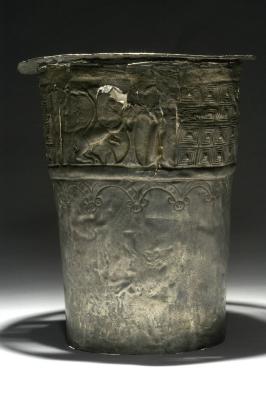Beaker Physical Object
Accession Number
2004.003.0001aAlternate object names
CupMaterials
Description
This silver aquilla is one of what would have been a matched pair of beakers. It is of a tapering cylindrical form, with a wide everted rim (2004.003.0001b) and decorated around the top sides with multiple conjoined square Chimu-Inca style frets and two lions (opposite sides of each other). A section is missing around top near rim and head of one of the lions. There are vertical holes on columns on either side of lion (absent head). Small holes are found in various sections around the sides and bottom. It was found on the Atocha wreck site nested with another beaker (see 2003.006.0001a), and both beakers were slightly crushed.Paired sets of drinking vessels were an important part of traditional Incan culture. Chicha (maize beer) was consumed from the vessels, and the simultaneous use of the pair was symbolic of reciprocity, sharing, and commonality, ideals that reinforced social bonds. With the presence of lion icons hammered into the metal, this aquilla reflects a Spanish influence on Incan tradition – the lion was an animal unknown to Native Andeans. Similar beakers made of wood are called queros.
Dimensions
13.0 x 9.8 (top) x 7.5 (base) cm.
Exhibition Label
Case Caption (2023): N/AObject Caption (2023):
Aquillas or Keros (Beakers)
Silver (c.1610)
Gift of Dolores Fisher
2003.006.000la-b, 2004.003.000la-b
Duality was an important concept in Andean culture, symbolizing opposing or complimentary forces coming together to create something new and better. Festivities, in which food and drink were shared, were very important to the Inca empire. Friendly relations were reinforced, and power consolidated. Matching beakers were used in pairs for occasions such as welcoming strangers, forging an agreement, making funeral offerings, or celebrating friendship.
